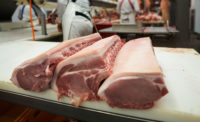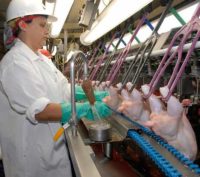This week, the United Food and Commercial Workers (UFCW) International Union filed a federal lawsuit to stop the U.S. Department of Agriculture (USDA)’s new swine slaughter modernization rule that eliminates line speed limits in pork slaughter plants, ultimately giving inspection responsibility to said slaughter plants. The lawsuit alleges that the new rule violates the Administrative Procedure Act because it is not backed by reasoned decision-making.
UFCW filed the lawsuit in conjunction with Public Citizen Litigation Group and three separate, local UFCW unions.
According to UFCW president Marc Perrone, "Increasing pork plant line speeds is not only a reckless giveaway to giant corporations, it will put thousands of workers in harm’s way. This new rule would also dramatically weaken critical protections that Americans depend on to be able to select safe, healthy food to feed their families every day. The safety of America’s food and workers is not for sale and this lawsuit seeks to ensure this dangerous rule is set aside and these companies are held accountable.”
Another statement from Public Citizen attorney Adam Pulver says that “USDA admitted in its rule that it simply ignored the mounds of evidence that showed its actions will harm workers while bending over backward to help businesses. That violates basic principles of administrative law,”
The lawsuit alleges that USDA is not taking into consideration the link between worker safety and food safety.
Meatpacking workers suffer injuries and illnesses at a rate 2.3 times higher than the average for all private industries, according to the Bureau of Labor Statistics. Swine slaughter workers regularly have reported extreme pressure to work as fast as possible, which increases the risk of repetitive motion injuries; tendonitis; carpal tunnel syndrome; knee, back, shoulder and neck traumas; and lacerations from knives and blades. UFCW members who work at pork plants previously have suffered from all of these injuries.
In response to comments and concerns that the agency did not take into consideration the public health impact of increasing line speeds, in part, USDA said in the final rule that, “While the relationship between line speed and Salmonella prevalence was not incorporated into the risk assessment model, FSIS did consider the impact of line speed on Hazard Analysis and Critical Control Points-Based Inspection Models Project (HIMP) establishment performance in the Hog HIMP Report.”
USDA’s entire final rule document can be viewed at FSIS.USDA.gov.
Sign up for Food Safety Magazine’s bi-weekly emails!
Subscribe to our podcast: Food Safety Matters!




